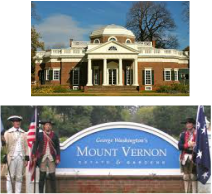
After we finished sightseeing in Washington, D.C., we visited George Washington's home, Mount Vernon, in nearby Virginia. Well, first, we had to find it. We didn't have GPS back then, so it took a while to figure out how to get there. After driving on a long, winding road through some woods, we finally made it. We saw the drawing room, indoor kitchen, library, and bedrooms. I think one of the bedrooms had Washington's original bed in it. I don't remember much of the inside of the house, but I do know there were lots of other buildings near it, like the outdoor kitchen where the servants cooked in the summer, the smokehouse, and storage buildings.
After Mount Vernon, we looked for Monticello, which was further away. When we stopped to look around, the crickets were singing so loud, it was hard to hear anything else. It sounded like a deafening high-pitched choir. It was dark when we found Monticello's sign. (Both Washington and Jefferson apparently liked living in remote locations.) We stopped at a gas station, where my dad asked the man who worked there if any hotels were nearby. He turned out to be the owner, named Mohammed, and he very kindly invited us to his house to spend the night. The next day, he looked through a jar of coupons at the gas station and found three free passes to Monticello. It was nice having him along; he was nice and he knew where to go. Monticello was an interesting place; it had many of Thomas Jefferson's numerous inventions in it, like a giant clock that told the second, minute, hour, day, week, month, and year!
There were cases full of Thomas Jefferson's fossil collection and rooms full of books. No wonder he was so smart! We couldn't go upstairs, because the stairs were too narrow, but I enjoyed the part of the house that we could see. My dad took a picture of me, a tiny speck standing next to the giant pillars on the porch. Mohammed stood closer to the camera; my dad joked that he wanted to make sure his good-looking face was in the photo. As good as Monticello was though, the best part for me that day was driving up the mountain that Monticello was built on. Monticello looked little compared to the mountain.
After Mount Vernon, we looked for Monticello, which was further away. When we stopped to look around, the crickets were singing so loud, it was hard to hear anything else. It sounded like a deafening high-pitched choir. It was dark when we found Monticello's sign. (Both Washington and Jefferson apparently liked living in remote locations.) We stopped at a gas station, where my dad asked the man who worked there if any hotels were nearby. He turned out to be the owner, named Mohammed, and he very kindly invited us to his house to spend the night. The next day, he looked through a jar of coupons at the gas station and found three free passes to Monticello. It was nice having him along; he was nice and he knew where to go. Monticello was an interesting place; it had many of Thomas Jefferson's numerous inventions in it, like a giant clock that told the second, minute, hour, day, week, month, and year!
There were cases full of Thomas Jefferson's fossil collection and rooms full of books. No wonder he was so smart! We couldn't go upstairs, because the stairs were too narrow, but I enjoyed the part of the house that we could see. My dad took a picture of me, a tiny speck standing next to the giant pillars on the porch. Mohammed stood closer to the camera; my dad joked that he wanted to make sure his good-looking face was in the photo. As good as Monticello was though, the best part for me that day was driving up the mountain that Monticello was built on. Monticello looked little compared to the mountain.
 RSS Feed
RSS Feed